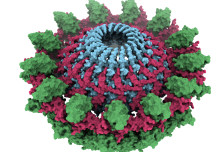

Cost analysis
Meningitis jab could be cost-effective for combating gonorrhoea
A meningitis vaccine could be cost-effective in combating gonorrhoea amid rising cases globally and increased resistance to drug treatments.



Meningitis jab could be cost-effective for combating gonorrhoea
A meningitis vaccine could be cost-effective in combating gonorrhoea amid rising cases globally and increased resistance to drug treatments.


Cyclones health impact and squeezing cells: News from the College
Here’s a batch of fresh news and announcements from across Imperial.


3D-printed Sensor on Fibre-Optic Probes for Rapid Bacteria Detection
The Hamlyn Centre research developing miniature fibre-optic probes for label-free bacteria detection was recently featured by Nanoscribe.


Scientists discover new approach to fighting antibiotic resistance
A new approach to fighting antibiotic resistance could help to prevent diseases by making bacteria vulnerable to treatment again.


Miscarriage may be linked to changes in vaginal bacteria
A new study finds that changes to a mother’s vaginal microbiome may be associated with pregnancy loss.


Engineers create spiky materials inspired by insects that could pop bacteria
Researchers have created intricately patterned materials that mimic antimicrobial, adhesive and drag reducing properties found in natural surfaces.


New £10m centre to explore links between organisms and their microbiomes
The £10m Leverhulme Centre for the Holobiont aims to create a green revolution in agriculture, rescue threatened species, and restore habitats.


New cross-disciplinary Collaborations Address Societal Challenges
The Institute for Molecular Science and Engineering (IMSE) has funded new cross-disciplinary research to address societal challenges.


Key step in how bacteria acquire drug resistance revealed
Researchers have imaged a major component in conjugation – the process bacteria use to share DNA with each other.


New test rapidly detects bacteria associated with greater risk of preterm birth
A study has found that a new device can rapidly and accurately detect changes in vaginal bacteria and corresponding immune responses in pregnant women